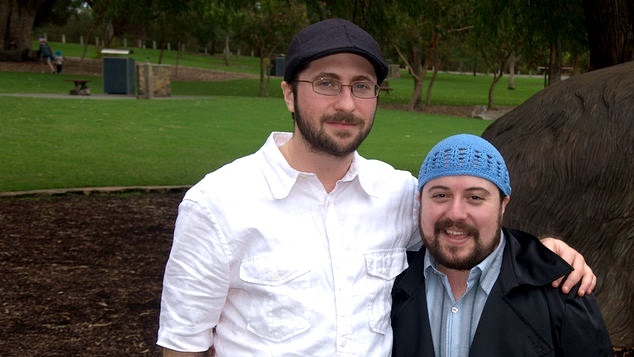
Dr Gávi Ansara, PhD is many things. He’s Manager – Policy & Research at the National LGBTI Health Alliance in Australia. Outside of this role, he is an internationally award-winning social change agent, researcher and a leading scholar on intersex, trans, and non-binary gender health. He’s also an Orthodox Jewish man who challenges stereotypes about religious people and people of LGBTQ & I experience.
“My husband Sruli and I have often been told by people in states and territories across Australia that we are currently the only same-gender partners in Australia where we are both fully Orthodox in our observances, both members of the Orthodox Jewish community, and both open about being a same-gender couple. We do know people who are various levels of traditional and observant and various levels of open about being together, but we keep being told we are the only ones. I sincerely hope this isn’t true. If anyone’s reading this and they’d like to get in contact, please do. When I moved back to Australia in late 2012 after twenty years away to work at the Alliance, I wasn’t aware of just how few people here were speaking out about these issues. It’s been a privilege and an honour, but also a humbling responsibility.”
After growing up in Australia and China, Dr Ansara travelled extensively, meeting LGBTQ & I peoples and religious communities around the world. He has observed various intersections between the two. “It’s interesting. I gave a talk at a synagogue in Melbourne, and there was a gay Muslim man who brought his gay Christian friend along. When I finished talking, both of them had tears in their eyes, because they could relate to the experience. So although my particular background as an Orthodox, traditionally observant Jew is a big part of my own experience, it’s actually something that resonates with Muslim and Christian people who are of LGBTQ & I experience and with those from other spiritual and faith traditions.”
“Just as people of LGBTQ&I experience encounter stereotypes, there’s a stereotype that all Jews are from Anglo-European background. In fact, there are extensive African, Asian, Middle Eastern, and other Jewish traditions. It’s important for that diversity to be recognized.“
“Dr. Ansara explained that the principles of his faith intersect with his efforts as an advocate for LGBTQ & I equality. “In traditional Judaism, there’s a principle called Tikkun Olam. Tikkun Olam is a principle that essentially means mending the world. I hear many stories of religious people who are in tremendous pain. Some attempt suicide due to rejection or bullying by their communities. Some religious leaders need help to understand these needs. Some religious leaders need support to continue helping LGBTQ & I people, where they are lone voices with limited resources. Jewish values honour the person and the body. Intersex people and people of trans experience need to be included in those values. Supporting leaders and communities to treat people with respect is how we can make that happen.”
“We live in an imperfect world. Judaism holds that the whole purpose of human existence is about that process of mending the world. My work at the Alliance is completely non-denominational and non-sectarian, and includes all belief systems and none. However, I bring to that work my background as an Orthodox Jew in a same-gender relationship. I bring my experience and understanding of how important spirituality can be for people of all faith traditions, spiritualities, and belief systems. I bring an understanding of how excluded many people of LGBTQI experience feel both from faith environments and from LGBTQ & I communities. I see my life’s work—my spiritual calling, beyond any official title—as transforming that pain into song, listening to voices of marginalised peoples, and bringing people together in loving kindness.”
Sophie Joske




